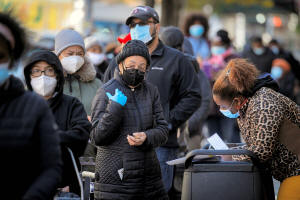Low-income U.S. households are spending savings quicker than high
earners: study
 Send a link to a friend
Send a link to a friend
 [December 16, 2020]
By Jonnelle Marte [December 16, 2020]
By Jonnelle Marte
(Reuters) - U.S. households across the
board built up savings during the pandemic, but low-income households
are burning through their cash more quickly than higher-income families
and could be out of savings soon if more aid is not delivered, according
to a study released on Wednesday.
By the end of October, the median low-income family spent 64% of the
extra cash they accumulated this year compared with last year, leaving
them with about $236 in extra cash, according to a report released
Wednesday by the JPMorgan Chase Institute. In contrast, higher-income
households lost just 38% of the cash cushion built up this year, and had
a median $810 in savings, the study found.
"If these trends continue, we would expect low-income families to
deplete their account balance gains sooner than their high-earning
counterparts," researchers noted in the report.

(GRAPHIC: Cash piles shrinking - https://graphics.reuters.com/USA-ECONOMY/rlgpdqoabvo/chart.png)
The JPMorgan Chase study showed that cash balances appeared steady on
average after rising earlier this year, in line with a separate report
released by the Federal Reserve last week showing that balances in cash,
checking accounts and savings deposits rose over the three months ending
in September to a record $13.4 trillion.
But a look at cash balances for the median household - which is not
affected as much by households with abnormally high, or unusually low,
account balances - showed a more volatile experience.
[to top of second column]
|

People line up to receive free holiday boxes of food from the Food
Bank For New York City ahead of the Thanksgiving holiday, as the
global outbreak of the coronavirus disease (COVID-19) continues, in
the Harlem neighborhood of New York, U.S., November 16, 2020.
REUTERS/Brendan McDermid/File Photo

The median cash balance for checking account holders studied by
JPMorgan Chase rose in the spring when the government distributed
cash payments to most households - and balances have been declining
since.
Those households could experience another substantial drop in income
and spending at the end of the year when unemployment benefits are
set to expire for millions of workers participating in pandemic
programs created by the CARES Act, the researchers said.
Consumers have previously cut spending on non-durable goods by 12%
after losing unemployment benefits, and those receiving jobless
benefits reduced spending by 14% over the summer after a $600 weekly
supplement to unemployment benefits expired at the end of July, the
study noted.
Lawmakers have yet to reach an agreement on another round of aid.
Some COVID-19 relief measures could be attached to a critical
spending measure that must be passed by Friday to avoid a federal
government shutdown.
(Reporting by Jonnelle Marte in New York; Editing by Matthew Lewis)
[© 2020 Thomson Reuters. All rights
reserved.] Copyright 2020 Reuters. All rights reserved. This material may not be published,
broadcast, rewritten or redistributed.
Thompson Reuters is solely responsible for this content.
 |